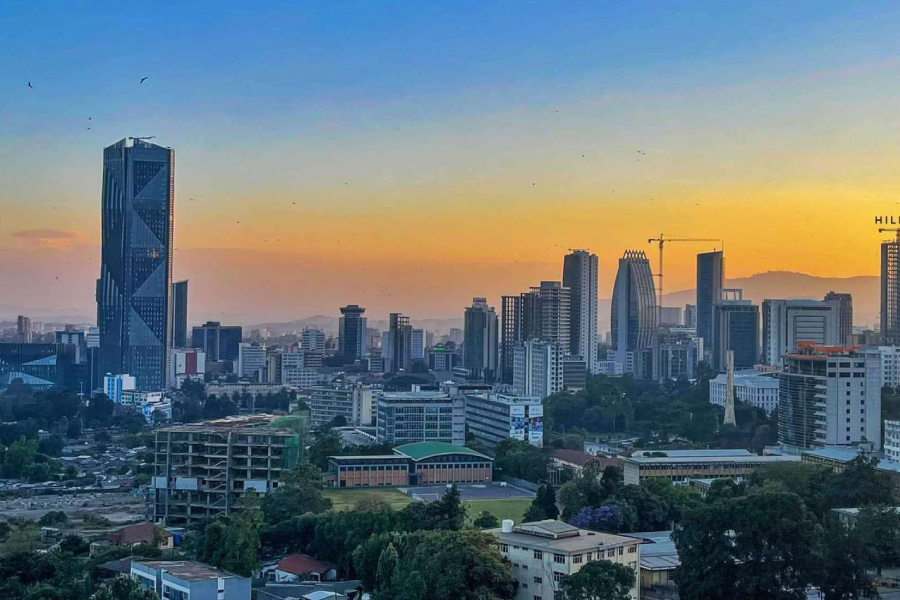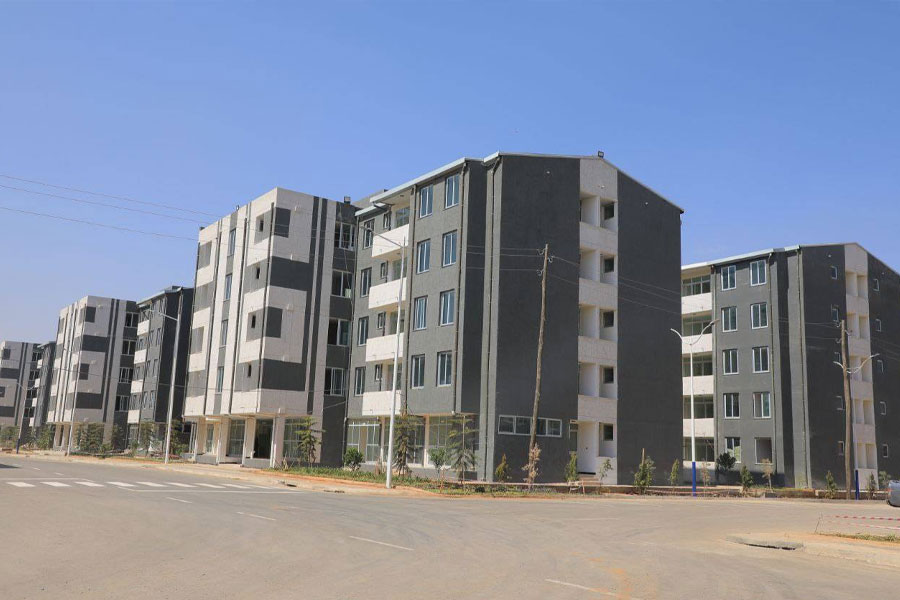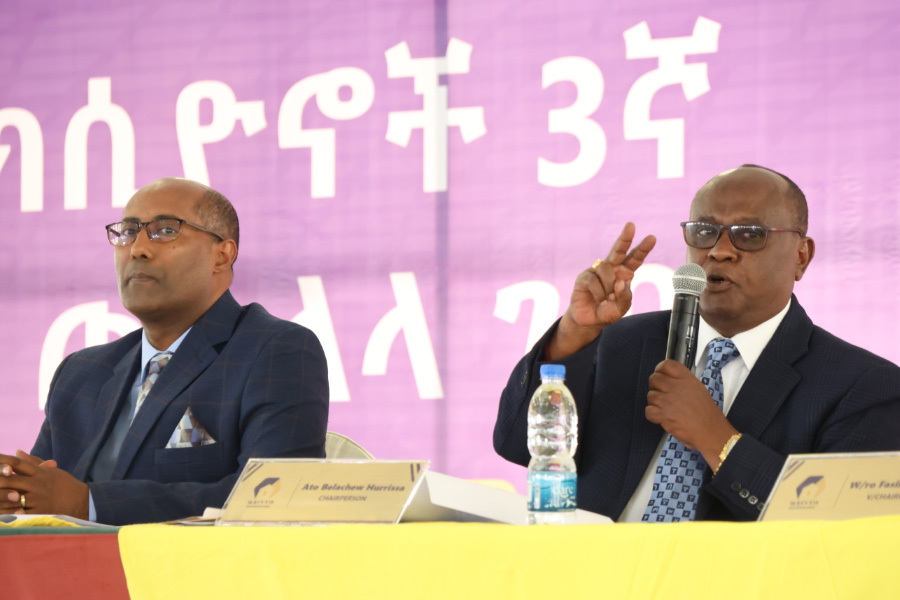
Fortune News | Jul 17,2022
Dawit Arega, a tourist guide for 14 years, has encountered difficulties with his National Identification. Enrolling in the initiative when it launched in September 2022, he hoped it would simplify professional and personal transactions.
However, the implementation has proven far from seamless for him.
The six-month delay in receiving his ID compounded his frustration. After voicing his dissatisfaction on social media, Dawit said the institution intervened, printing his ID at the Ethio Post branch.
Then came issues with the unscannable QR codes on his printed card. He remains concerned about the limited acceptance to use services and notes a lack of awareness among officials, which usually leads to rejections. He cited facing difficulty booking hotel rooms, transferring money, and verifying international accounts.
“It's not practical,” he said.
The National ID Program (NIDP), also known as Fayda, was established to provide a unique digital identity to every legal resident and citizen of Ethiopia. Spearheaded by the Prime Minister’s Office, Fayda aspires to simplify access to essential services, improve governance, and combat identity fraud, according to the World Bank, which financed the project.
Key milestones in the program’s development include the 2019 launch of Digital Ethiopia 2025, outlining the government’s vision for digital transformation with a national digital ID as a cornerstone. The Fayda Digital ID initiative officially launched in 2021, introducing unique identification numbers supported by biometric technology.
Fayda’s technology is built on the Modular Open-Source Identification Platform (MOSIP), developed by the International Institute of Information Technology Bangalore and partially funded by the Bill & Melinda Gates Foundation, enabling countries to build cost-effective digital ID systems.
Officials believe a unified and reliable ID system in Ethiopia is momentous as rapid rural-urban migration has strained existing paper-based identification methods.
Federal and regional authorities currently rely on a fragmented system of Kebele IDs issued by 16,000 local administrations, alongside driving licenses, pensioner cards, health insurance booklets, and tax administration numbers. These systems lack interoperability, leading to inefficiencies and vulnerabilities.
Almaz Tefera, general manager of the Document Authentication & Registration Service (DARS) Kirkos branch, underlines the program’s essence. Her office fully transitioned to using national IDs for services, particularly those involving fixed property, after repeated incidents of property sales based on forged IDs.
“It assures that each person has one identity,” she told Fortune.
Almaz noted the national ID fraud-prevention capability. While her branch registers 50 people daily for national ID, Kebele IDs referred to as ‘digital IDs’ are still required for registration.
Although the branches were successful in the adoption of Fayda, other government institutions have been sluggish. While several government institutions, including the Ministry of Revenues, Federal Public Procurement & Property Authority, Addis Ababa Civil Registration & Resident Services (CRRSA), Ethio telecom, Ethiopian Airlines, and commercial banks, have successfully adopted the national ID, others like the Addis Abeba Driver & Vehicle Licensing & Control Authority remain hesitant.
Desalegn Tefera, head of the Authority, cites a "lack of supportive directives" as the reason for this reluctance. Although the city administration's directive to make national ID registration mandatory for all government services, the continued requirement for Kebele IDs suggests a persisting dual system.
Andamlak Teklu’s experience reveals inconsistencies in the adoption of the National ID system. After being detained, Andamlak Teklu needed a bailsman. However, when his friend showed a national ID, Andamlak said it was not accepted, with officers insisting on a Kebele ID instead.
Addis Abeba Police Commission affirms the recognition of the national ID as a reliable verification tool. However, Markos Tadesse, communication head at the Commission, clarified that while the national ID is generally accepted, specific cases usually require additional guarantees.
Some residents wonder what the difference between the two identifications is. Yodahe Arayaselassie, executive director of the Program, attempted to differentiate their use.
“While Kebele IDs serve as proof of residency, the national ID designates a unique identity,” he said in an interview with local media.
In the financial sector, which faces rising cases of fraud and forgery, Fayda is seen as a critical tool, according to officials. The National Bank of Ethiopia (NBE) has mandated all banks to use national IDs for account openings, with a phased rollout beginning in 2025 and nationwide compliance expected by 2026. This measure aims to enhance financial security, promote inclusion, prevent fraud, streamline customer onboarding, and safeguard data.
Demissew Kassa, secretary general of the Ethiopian Bankers Association, disclosed that the association will import 3,000 registration kits. Observers state each costs up to 3,500 dollars.
Although importation delays have slowed progress, individual banks are making investments in the kits. Berhan Bank, for instance, has allocated 24 million Br to import 150 registration kits. Ermias Tefera, president of the Bank, noted its critical role in fraud prevention, claiming that forged Kebele IDs were implicated in 90pc of bank fraud cases. He urged implementation, cautioning that “coordination should be a serious task.”
The NBE’s second financial stability report, released last month, revealed a sharp rise in bank fraud and forgery, with losses totalling 1.3 billion Br in 2023/24. This increase, attributed to fake cash and checks, embezzlement, unauthorised bank guarantees, ATM card theft, and phishing scams, underlines vulnerabilities in the current system.
Beyond financial institutions, other sectors are adopting Fayda. The CRRSA, which issues Kebele IDs, now mandates Fayda for certain services. According to Jemila Dua, communication head, the previous Kebele ID system suffered from an absence of uniformity and fragmented registration practices across regional states. Fayda’s integration of various services, including birth certificates, aims to streamline these processes. However, Jemila noted that Kebele IDs remain necessary for certain services, such as residential identification required for property purchases.
Ethio telecom, a major partner in the National ID program, has also played a pivotal role in its implementation. Solomon Abera, the company’s customer experience director and chief quality officer, revealed that they have deployed seven printing machines and established 63 pickup centres, primarily in Addis Abeba, with plans to expand to towns like Hawassa, Adama, and Nekemte.
Solomon projected that the National ID Program would register 34 million individuals in the fiscal year. According to him, Ethio telecom’s national ID registration initiative, launched in April 2024, has already registered 4.2 million individuals. The company plans to scale its capacity to three to four million registrations a month and print 48 million IDs annually. Addressing concerns about unreadable QR codes, Solomon noted the use of laser engraving technology to ensure durability.
Ethiopost, another major player in the program, has a capacity to print 40,000 national IDs in eight hours and is currently printing 15,000 IDs daily. It registers 8,000 people daily across its branches in Addis Abeba. Belayneh Mamush, communication head, acknowledged overcrowding at some branches, which has caused delays in delivery. However, he denied any printing quality issues, asserting that they employ high-definition printing.
Prime Minister Abiy Ahmed (PhD) has expressed strong support for the National ID Program, highlighting its potential to increase Ethiopia’s GDP by seven percent if all eligible citizens register. He noted its role in formalising the informal market, reducing land and bank fraud, and improving economic transparency.
Registering around 10 million individuals so far, officials at the National ID Program acknowledged concerns about unreadable QR codes, attributing the issue to damaged cards or substandard printing quality. To address these issues, they recommend using Fayda’s verification tools and adhering to strict printing standards.
The World Bank’s 350 million dollar investment in December accentuates Fayda’s compliance with global principles of Identity for Development (ID4D), which prioritise minimal data collection. Ethiopia’s Digital Identification Proclamation notes that digital identification is a right, not an obligation. While the managing institution cannot mandate registration, regulatory bodies may require it for specific services under sector regulations.
A 2022 study on Uganda's national ID system reveals that, despite initial promise, it faces issues that undermine its effectiveness. As of 2014, only 7.6pc of Ugandans had a long-form birth certificate, making it difficult to establish citizenship and hindering the national ID process. Since prioritising national ID enrollment in 2014, civil registration rates have declined, with coverage currently at just 63pc. This drop has affected various government ministries, which struggle with an incomplete system, leading to public dissatisfaction with service delivery.
The National Identification & Registration Authority (NIRA) wrestles with issues such as inadequate infrastructure, underfunding, and a lack of field offices. Resources have been diverted to initiatives like the "learners project" and SIM card registration, limiting the capacity for routine operations. In contrast, countries like Rwanda and Zambia have achieved higher enrollment rates due to their more effective strategies and infrastructure.
Abel Tefera, a technological expert and project manager at STEMpower, noted the importance of extensive mobilisation to achieve the program’s ambitious goal of registering 90 million people by the end of 2025. He suggested incentivising registration in regional areas and emulating successful telecom marketing strategies.
According to Abel, targeting high-population areas such as schools, universities, and religious institutions could boost registration.
To expand the program’s reach, Abel proposed outsourcing registration to small and medium enterprises. He also identified the lack of pre-registration awareness campaigns as a major issue, leading to misconceptions and resistance among potential users.
Abel advocated for assembling registration gadgets locally to reduce expenses. He argued that Fayda’s impact on GDP could exceed current projections, effectively curtailing illicit financial activities, improving transaction control, and promoting economic transparency.
PUBLISHED ON
Dec 08,2024 [ VOL
25 , NO
1284]

Fortune News | Jul 17,2022

Radar | Jul 17,2022

Fortune News | Aug 04,2024

Fortune News | Oct 13, 2024

Viewpoints | May 11,2024

Delicate Number | Aug 16,2025

Radar | Feb 18,2023

Radar | Sep 14,2025

Radar | Feb 03,2024

Radar | Nov 24,2024

Dec 22 , 2024 . By TIZITA SHEWAFERAW
Charged with transforming colossal state-owned enterprises into modern and competitiv...

Aug 18 , 2024 . By AKSAH ITALO
Although predictable Yonas Zerihun's job in the ride-hailing service is not immune to...

Jul 28 , 2024 . By TIZITA SHEWAFERAW
Unhabitual, perhaps too many, Samuel Gebreyohannes, 38, used to occasionally enjoy a couple of beers at breakfast. However, he recently swit...

Jul 13 , 2024 . By AKSAH ITALO
Investors who rely on tractors, trucks, and field vehicles for commuting, transporting commodities, and f...

Sep 13 , 2025
At its launch in Nairobi two years ago, the Africa Climate Summit was billed as the f...

Sep 6 , 2025
The dawn of a new year is more than a simple turning of the calendar. It is a moment...

Aug 30 , 2025
For Germans, Otto von Bismarck is first remembered as the architect of a unified nati...

Aug 23 , 2025
Banks have a new obsession. After decades chasing deposits and, more recently, digita...